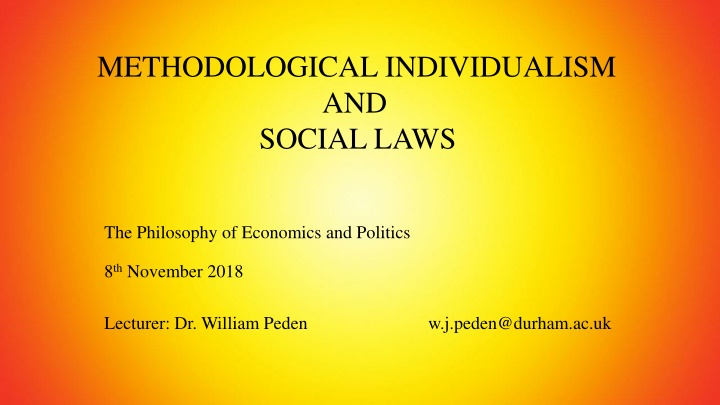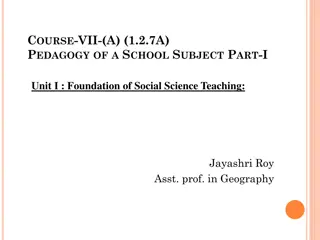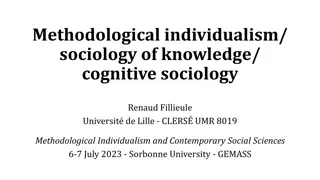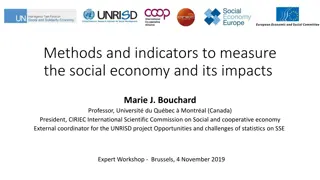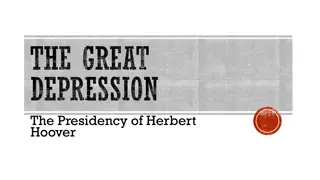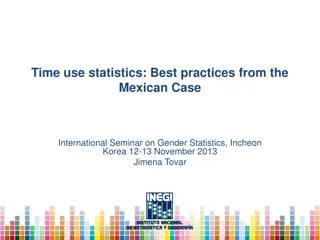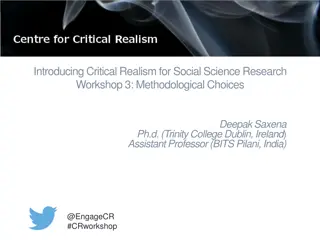Methodological Individualism in Social Science
Critiques of invoking external agents in economics, the importance of individual behavior in explaining economic outcomes, and various interpretations of methodological individualism in social science are discussed. The focus is on explaining social phenomena through terms related to individual beliefs, values, and actions.
Download Presentation

Please find below an Image/Link to download the presentation.
The content on the website is provided AS IS for your information and personal use only. It may not be sold, licensed, or shared on other websites without obtaining consent from the author.If you encounter any issues during the download, it is possible that the publisher has removed the file from their server.
You are allowed to download the files provided on this website for personal or commercial use, subject to the condition that they are used lawfully. All files are the property of their respective owners.
The content on the website is provided AS IS for your information and personal use only. It may not be sold, licensed, or shared on other websites without obtaining consent from the author.
E N D
Presentation Transcript
METHODOLOGICAL INDIVIDUALISM AND SOCIAL LAWS The Philosophy of Economics and Politics 8thNovember 2018 Lecturer: Dr. William Peden w.j.peden@durham.ac.uk
[the kind of economics he is criticising] invokes an agent from outsidethe economy labelled government tasked with selflessly correcting market failures the invocation of a disembodied benign agent violates the principle of methodological individualism. - Meir Kohn (2004, p. 325-326)
Many Meanings of Methodological Individualism! Lars Udehn (2002)
Many Meanings of Methodological Individualism! Lars Udehn (2002)
Methodological Individualism Meir Kohn (2004): economic outcomes should be explained purely in terms of individual behavior. (p. 308) Prediction and explanation in social science But what s a good explanation? - A (partial) theory of social scientific explanation - Specifying a necessary condition (a requirement) Still many versions focus on most plausible
A theory T is a satisfactory explanation of a social phenomenon only if T is formulated using: (a) Terms describing individual beliefs, values, and actions (b) Terms reducible to (a) (c) Some mix of (a) and (b)
Half-way explanations Sufficient explanations MI explanations Rational choice explanations John Watkins 1924-1999 - Could explain a pattern of voting in terms of individuals irrational thinking
NOT a metaphysical claim! NOT a claim about which theories are true! NOT a claim about meaningfulness! NOT a defence of individualist politics!
Friedrich Hayek (libertarian) Max Weber (liberal) Karl Popper (liberal/social democrat) Jon Elster (Marxist communist) 1864-1920 1899-1992 1902-1994 1940-
Classes Hats A full understanding?
Collective terms in social science do denote individuals But they are not always definable using individual terms Defensive move: we can observe collective attitudes/behaviours e.g. hostile crowd Ernest Nagel Offensive move: there are some sufficient social explanations with irreducible collective terms 1901-1985
Nagel (1961): something like Keynesianism is needed for some explanations, but has non- reduced collective terms - Sticky wages/prices Reduction: inconsistent with microeconomics? BUT: the New Keynesians worked hard to develop microfoundations for Keynesianism (1970s/1980s/1990s) John Maynard Keynes 1883-1946
Compromises? Old theories of scientific explanation: focus mostly about the logical features of explanations Modern theories: more attention to aims of explanations - E.g. Bas Van Fraassen MI as a theory of social scientists aims?
Revised MI: Only explanations of social phenomena in individual terms can be fully satisfying explanations
Comparative MI: Ceteris paribus, T1 is preferable to T2 as an explanation of a social phenomenon P if T1 explains P in an MI way and T2 does not - The New Keynesians?
Social Laws Alternatives to MI explanations? - (Law-explanations CAN satisfy MI) Do social scientific laws actually explain anything? Interpretation of laws in social science?
Social scientists: making deductions of phenomena using exceptionless laws or confirming them with probabilistic laws - DN/IS model Carl G. Hempel One (of many) problems where are these in social science? (1905-1997) - Tautologies or have exceptions (?)
Mill: social laws as tendency laws TENDENCY: what happens ceteris paribus Tendency laws are generalisations that: John Stuart Mill (1) Can have exceptions (1806-1873) (2) Express tendencies of a mechanism, including e.g. a social system - A more modern philosopher of explanation!
Properties of a tendency: (1) A kind of causation (2) If there is a tendency in a mechanism then it produces an effect if there are no disturbing factors S bastien Chabal (1977-) (3) Make a contribution even when there are disturbing factors
Causal tendency laws: make sense of social scientific explanations via laws? An increase in the level of currency increases the level of prices if there are no disturbing factors e.g. new regulations raising banks demand for currency reserves Nancy Cartwright (1944 -) How can causal tendencies provide informative guidance for social policy?
SUMMARY Methodological individualism: many meanings Stronger and weaker claims about our explanatory objectives in social science Tendency laws: a possible alternative to individualist explanations of social phenomena - Good news for Marx?
Bas Van Fraassen The Scientific Image (1980) Chapter 5 Jon Elster: Marxism, Functionalism and Game Theory (1982) Theory and Society John Watkins: Ideal Types and Historical Explanation (1952) The British Journal for Philosophy of Science Carl G. Hempel: Studies in the Logic of Explanation (1948) (with Paul Oppenheim) Philosophy of Science John Watkins: Historical Explanation in the Social Sciences (1957) The British Journal for Philosophy of Science Ernest Nagel: The Structure of Science (1961) Chapter 14 Section III Friedrich Hayek: The Counter-Revolution in Science (1964) Chapter 4 Lars Udehn: The Changing Face of Methodological Individualism (2002) Annual Review of Sociology John Stuart Mill: A System of Logic (1882) Book VI Chapter VI Meir Kohn: Value and Exchange (2004) Cato Journal (Other references in the module handbook)
